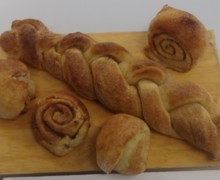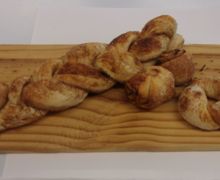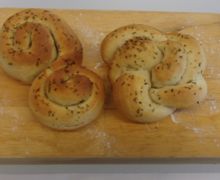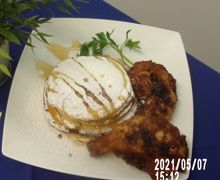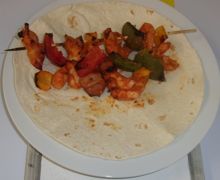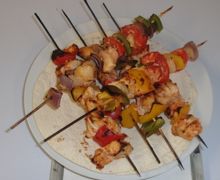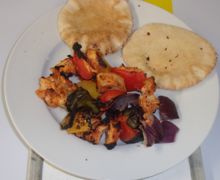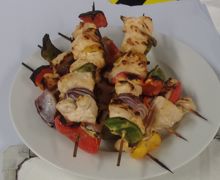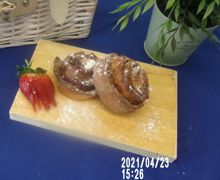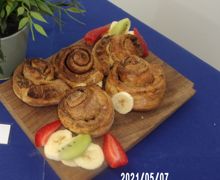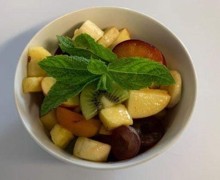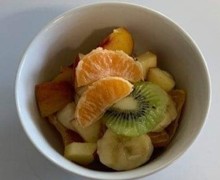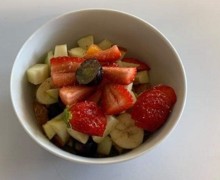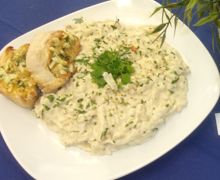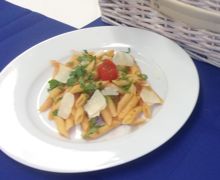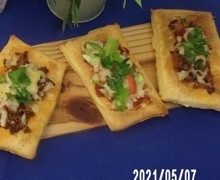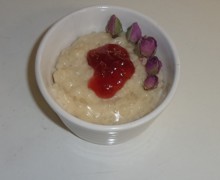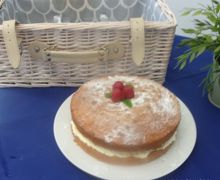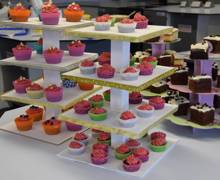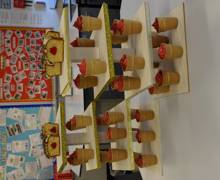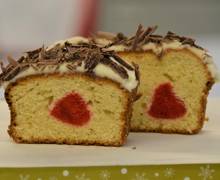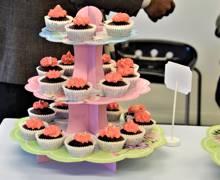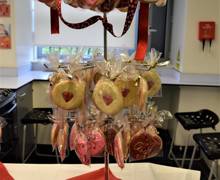- Home
- Secondary
- Subject Information
Food Preparation and Nutrition
BackFood Preparation and Nutrition is an exciting and creative course developing pupils’ practical skills and understanding of food nutrition, provenance and the working characteristics of foods.
This course helps learners develop their knowledge, understanding and skills required to cook and apply the principles of food science, nutrition and healthy eating to their every day lives. This course nurtures pupils, to build their confidence in the kitchen, and enable them to make informed decisions about the food they eat. Students will gain knowledge and safe preparation skills in order to be able to feed themselves and others affordably and nutritiously, now and later in life.
Course Information
Through innovative teaching and active learning, pupils will develop foundation knowledge throughout KS3 supporting a potential progression into GCSE, grounded in a solid foundation of core learning and skills. The content and structure of this course enables learners to make connections between theory and practice so that they are able to apply their understanding of food science and nutrition to practical cooking.
Students will be able to apply their knowledge of food nutrition to practical preparation tasks. Pupils will lean about; cooking of food and heat transfer, functional and chemical properties of food, food spoilage and contamination, principles effecting food safety, sustainability, food labelling and marketing, food processing and production and sensory evaluation.
The Food Preparation and Nutrition GCSE will help you to develop a greater understanding of nutrition, food provenance and the working characteristics of a range of different ingredients. You’ll also learn about food from around the world, developing an understanding of where food comes from (food provenance) and the challenges surrounding food security. You’ll master culinary skills and appreciate the science behind food and cooking. This is an exciting and creative course which will allow you to demonstrate your practical skills and make connections between theory and practice.
KS3
Students in Key Stage 3 learn to understand their basic daily needs for nutritional wellbeing. Students are offered exciting and interesting experiences that focus on learning to produce nutritious and healthy meals based on the national healthy eating guidelines and the Eatwell Guide.
Through a range of practical and written activities, students learn the basic knowledge and skills needed to engage in making their own nutritious and healthy meals. Students are expected to gain useful life skills and cooking techniques, which will enable them to prepare nutritious meals at home for their families.
Food preparation and cooking skills include; cutting techniques, safe use of basic kitchen equipment and utensils, safe operation of cooker and oven, mixing and combining ingredients, measurements and planning ingredients and most importantly how to work safely and hygienically in the kitchen.
Key nutritional principles taught include; the Eatwell Guide, the importance of macronutrients (protein, fats, carbohydrates), micronutrients (vitamin and minerals), dietary fibre and water. Pupils will gain an awareness of dietary needs taking into account the different stages of life, vegetarians, allergies and religious considerations for example, and how dishes and meals can be planned to meet the needs of specific dietary groups.
KS4
Throughout year 10 students will acquire knowledge and practise the acquisition of food preparation skills. This learning is consolidated in year 11 and pupils will also complete 2 pieces of timed coursework (Non-Examined Assessment). The first piece of coursework focusses on experimenting with food science and development work and the second involves showcasing food preparation methods to make a 3 course meal for a set task. Finally, the course is completed with the written examination at the end of year 11.
Year 10
- Practical lesson - learning in depth food preparation skills from the set list including the application of molecular gastronomy. Students will also apply nutritional knowledge to dishes produced and explore the different types of food chemistry and functions. This is to prepare students for their NEA in Food Science and their NEA in food preparation.
- Theory lesson - Students will acquire knowledge on the specification topics in order to apply this in the practical classroom. This is to prepare students with the knowledge required for their written examination.
- Homework - Homework tasks are set to consolidate students learning and understanding of topics taught in lessons.
Year 11
The focus of year 11 is to complete 2 pieces of NEA and revisit the knowledge learnt in year 10 in order to revise for a written examination.
- NEA Food Science investigation 15% – applying food science and chemistry knowledge to experiments and writing up your findings in a 1500—2000 report / essay with photographs.
- NEA Food Preparation 35% – produce a 3 course meal within a 3 hour timed assessment showing as many food preparation skills as possible around a set brief. Write up and evaluate your findings within a 20 hour written report.
- Revision programme for the end of year 11—revisiting topics learnt in year 10—written examination 50%
NEA Task 1:
Food Science investigation 15%:1500-2000 report with photographs.
You will carry out an investigation into the scientific principles that underpin the preparation and cooking of food. This task will provide you with an opportunity to demonstrate your knowledge and practically apply your understanding of the science behind cooking. You’ll practically investigate ingredients and explain how they work and why.
The tasks for 2023-24 academic year were:
Sugar is one ingredient used to add to the sensory characteristics of biscuits. Investigate the working characteristics and the functional and chemical properties of a range of sugars used when making biscuits.
Eggs are one of the main ingredients when making meringues. Investigate the working characteristics and the functional and chemical properties of eggs or other ingredients when making meringues.
NEA Task 2:
NEA Food Preparation 35%, 20 hours, written report.
You will plan, prepare, cook and present a 3 course menu. This task will provide you with an opportunity to cook up a storm and showcase your creativity and cooking skills. You might make a street food menu, create delicious tapas dishes or cook up a menu for a student on a budget.
The tasks for 2023-24 academic year were:
We are advised to increase the amount of dietary fibre (NSP) we have in our diet. Research, prepare and cook 3 dishes (and accompaniments, if appropriate) that showcase your technical skills and demonstrate how dietary fibre (NSP) intake can be increased in a modern daily diet.
Many international hotels serve breakfast throughout the morning. The food served is usually very varied and reflects many different cultures. Research, prepare and cook 3 dishes (and accompaniments, if appropriate) that showcase your technical skills and would meet the requirements of a modern, international breakfast menu.
Assessment
Written Exam 50%. – There will be one exam for this qualification, which will assess your knowledge of the theory behind food preparation and nutrition. The exam will be 1 hour 45 minutes long. (50%)
NEA (Non-Exam Assessment) 50% – The second part of the assessment will be non-examination assessment (NEA) and will consist of two tasks, involving practical work. (50%) (Contextual challenges to be released annually by Eduqas in the September of the year prior to the submission of the NEA).
GCSE Results 2023
Congratulations to the Year 11 students on achieving 50% grades 9-4
GCSE Results 2022
Congratulations to the Year 11 students on achieving 55% grades 9-4.
Future Careers for Food Preparation and Nutrition:
The Food Preparation and Nutrition as a subject combines the principles of food science, nutrition and healthy eating.
It helps with developing cooking techniques, as well as knowledge of food traditions and kitchen safety.
The subject gives a range of skills, like planning and organising, working independently, understanding and applying science and even creative skills.
It can lead to a wide range of careers. For example, designing new ice cream flavours, or working in a hotel, restaurant or tourist attraction.
It is also helpful for working in distribution or retail for a supermarket or advising people about healthy eating as a nutritionist. Food technology combines well with biology, chemistry and business studies.
Curriculum Map
Outside the classroom
A number of extra-curricular events take place within the Food Department each year which are open to all pupils in order to share the culinary skills and successes of our school community. Pupils have been able to apply their learning, to help raise money for local charities through bake sales and soup kitchens.
TV shows:
Master chef - BBC IPLAYER, BBC ONE
Master chef junior - BBC IPLAYER, BBC ONE
Saturday kitchen - BBC IPLAYER
Sunday brunch - Channel 4 on demand
The chef show - Netflix
Great British menu - BBC IPLAYER, BBC TWO
Any program made by the following: Jamie Oliver, The Hairy Bikers, Heston Blumenthal, Rick Stein, James Martin or Nigella Lawson. - CLIPS ON YOUTUBE OR BBC / CHANNEL 4
Support your learning
Our aim is to enable students to express themselves through practical tasks and build a strong foundation of a wide range of practical skills across both subject areas.
We want all students to become independent learners, gaining confidence in the use of specialist equipment and terminology.
Students are encouraged to work autonomously, in groups and as a whole class when completing theory and practical tasks. We encourage creative thinking and methodical organisation and planning of the work to be undertake.
We actively promote the study of Food Preparation and Nutrition by both boys and girls to embrace the wide cultural make up of the school community, using it as a focus throughout many aspects of our learning experiences.
The practical skills learned and knowledge gained in Food Preparation and Nutrition are true life skills and will help to build your childs confidence in the kitchen.

